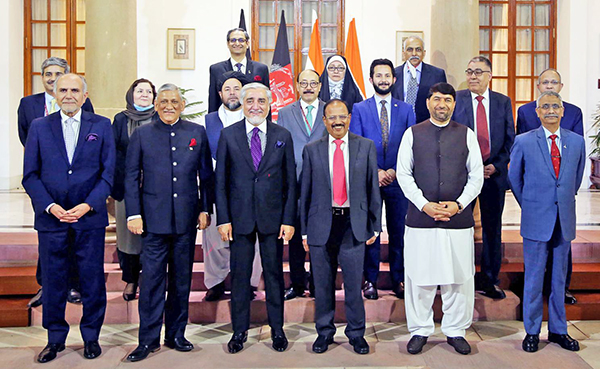
There is uncertainty and confusion surrounding the ongoing American withdrawal from Afghanistan. The Taliban and the Afghan government are holding direct talks, aimed at ending decades of war that has killed tens of thousands of people and ravaged various parts of Afghanistan.
The exclusively Pashtun, Afghan Taliban, are not only unacceptable to the non-Pashtuns, who constitute 58% of the population, but also to a substantial number of Pashtuns who loathe their extremism. But, with the Americans set to leave, the Taliban and its ISI backers are continuing military operations to acquire more territory under their control before formal discussions with the government on a ceasefire. Pakistan’s aim is to have a friendly Taliban-dominated government.
ALSO READ: Afghanistan : Cautious Welcome of US-Taliban Agreement in India
Even as American forces prepare to leave Afghanistan, the Taliban are not prepared to lay down their arms. The conflict between the Taliban and the Afghan government is set to continue, including in the non-Pashtun northern provinces.
Even as the Pentagon prepares to end active combat operations, there will be pressures on the US to continue equipping the Afghan armed forces. There will also be moves to persuade the Americans to provide air support by retaining warplanes and helicopter gunships in places like the Bagram Base near Kabul, and in Kandahar, while also using carrier-based airpower.
Abdullah’s Visit
Dr Abdullah Abdullah, chairman of the High Council for National Reconciliation in Afghanistan, met prime minister Narendra Modi, on 8 October, to brief him on the peace process and the talks being held by the Afghan government and the Taliban at Doha in Qatar.
Abdullah was on a five-day visit as part of an outreach to key countries in the region for seeking support for the negotiations in Doha. He travelled to New Delhi after a three-day visit to Islamabad.
Modi assured Afghan peace negotiator Abdullah of India’s continued backing for the peace process in Afghanistan.
Before arriving in India, Abdullah said in a statement that India is a “strategic partner of Afghanistan”. He added “the role of India in establishing a lasting peace in Afghanistan and the region is vital.”
Abdullah also met national security adviser (NSA) Ajit Doval, who told him India favours a democratic and sovereign Afghanistan “where no terrorists can operate,” foreign minister S Jaishankar, foreign secretary Harsh Shringla, Chief of Defence Staff Gen Bipin Rawat, army chief Gen MM Naravane and other senior government officials.
India, the region’s largest provider of development aid to Afghanistan, has expressed concern at a recent spike in violence by the Taliban and terror attacks on minorities such as Sikhs. It has said intra-Afghan negotiations must ensure the interests of minorities, women and vulnerable sections of society and reduce violence across Afghanistan and its neighbourhood.
Where Does India Stand?
On September 12, an Indian delegation attended the inaugural ceremony of the intra-Afghan negotiations in Doha while S Jaishankar joined it through a video conference.
India has supported efforts to bring inclusive peace to Afghanistan by advising leaders of different ethnicities to work in cohesion with others for peace and nation-building. India favours the social and political reintegration of those who give up their physical and ideological association with terrorist groups and networks, resile from violence, and embrace pluralism and democracy.
There have been apprehensions in New Delhi that Pakistan might leverage its influence over the Taliban to step up cross-border terrorism in Jammu and Kashmir if the militant group regains political prominance after a possible peace deal between it and the Afghan government. Pakistan, which fears harmonious ties between India and Afghanistan.
New Delhi should also have serious discussions with the Taliban to ensure that the security of our diplomats in Kabul, Kandahar, Jalalabad and Mazar-e-Sharif, and for Indian personnel involved in aid projects, is guaranteed.
India has also been maintaining that care should be taken to ensure that any such process does not lead to any “ungoverned spaces” where terrorists and their proxies can relocate.
Peace Does Not Stand a Chance under Pushtun-dominated Taliban
About 4.3 million Afghan refugees fled to Pakistan and Iran during the Soviet intervention. Soviet casualties included 13,310 killed. The Soviets departed from Afghanistan in 1992. What followed was a brutal civil war, pitting the Soviet-backed Najibullah government against the ISI trained, radicalised Afghan mujahideen, who were joined by 28,000-30,000 radicalised Pakistani Pashtuns. These were the developments which led to the emergence of the Taliban. The present American intervention in Afghanistan has lasted 19 years.
Taliban proteges are almost exclusively Pashtuns, who constitute 42% of Afghanistan’s population. The majority 58% of Afghanistan’s population are made up of Tajiks (37%), together with relatively smaller numbers of Uzbeks, Hazaras (Shia), Baloch, Turkmen, and others.
The ethnic Hazaras, Shia descendants of Genghis Khan, have close ties with Iran, which will inevitably play a more active role in Afghanistan.
The united resistance was initially against the Soviet Union and thereafter against Pakistan and its Taliban proteges, who wanted exclusive control. Afghanistan’s legendary Tajik hero, Ahmed Shah Masood, forged a military grouping called the Northern Alliance to resist advances by Pakistan and the ISI-backed Taliban. The alliance, in turn, was given political, military and diplomatic support by India, Iran and Russia.
With bases in Pakistan, the Taliban moved northwards, only to meet resistance from the Alliance. The Americans started their post 9/11 military intervention two days after Masood was assassinated.

















